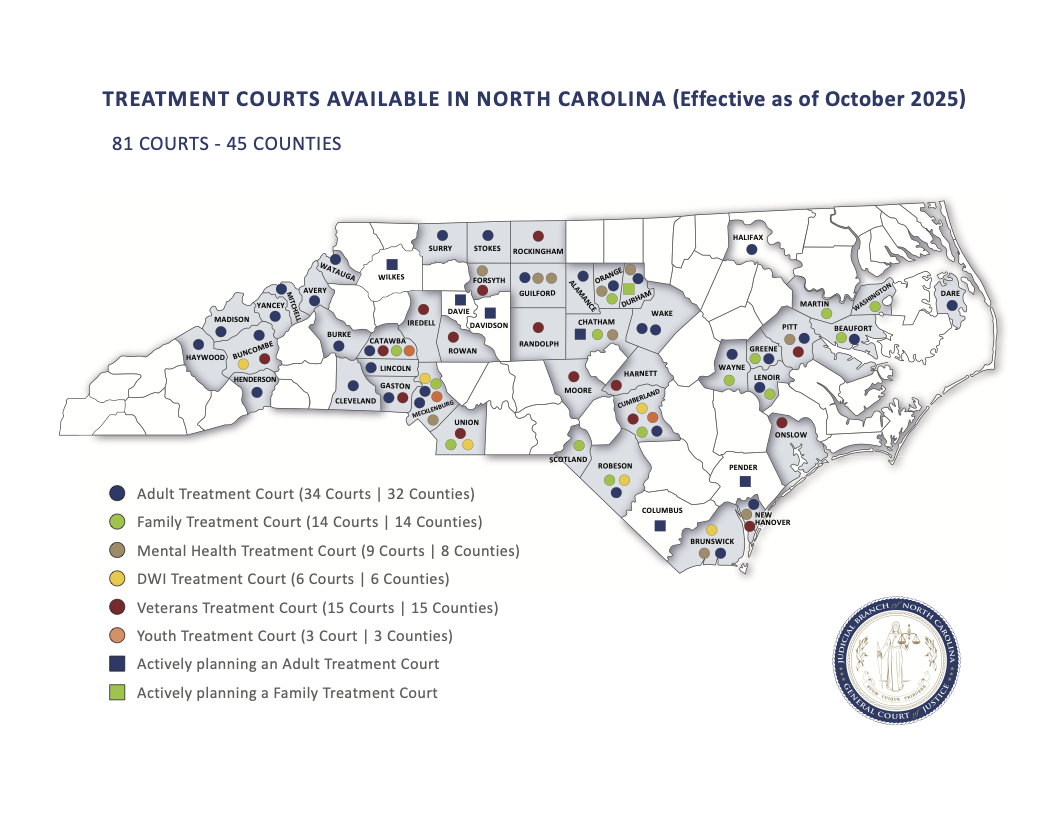Recovery Courts
About
The General Assembly enacted the North Carolina Drug Treatment Act in 1995. North Carolina General Statute Chapter 7A, Subchapter XIV, Article 62, established the North Carolina Drug Treatment Court Program in the Administrative Office of the Courts (AOC), and provided guidance on the implementation and operation of local Drug Treatment Courts (DTC). North Carolina Drug Treatment Courts have since been renamed North Carolina Recovery Courts as they have expanded to work with participants classified as veterans, those with a mental health diagnosis, and those convicted of driving while impaired.
Recovery Courts are an intensive, judicially supervised court intervention that targets individuals involved in the criminal and juvenile court systems with a substance use, mental health, or co-occurring disorder. This includes high-risk and high-need adult offenders, juveniles adjudicated in delinquency court, veterans, and parents involved in the abuse/neglect/dependency cases. A Recovery Court is comprised of a team of court and community professionals who closely manage cases so participants can become healthy, law-abiding, and productive family and community members.
Goals of Recovery Courts
- Adult Recovery Courts are an intermediate punishment that targets
repeat offenders who have a substance use, mental health, or
co-occurring disorder. - Family Recovery Courts work with parents and guardians who are in
danger of termination of parental rights due to the abuse or neglect of
their children resulting from substance misuse. - Youth Recovery Courts work with community-based, high-risk,
high-need juvenile offenders whose drug and/or alcohol use is
negatively impacting their lives at home, in school, and in their
community. - Mental Health Courts work with nonviolent offenders who have been
diagnosed with a substance use, mental health, or co-occurring
disorder. - Veterans Treatment Courts work with military service veterans with a
substance use, mental health, or co-occurring disorder. - DWI Courts work with repeat impaired drivers.
All Things Judicial Focuses on Brunswick County Recovery Courts - August 2023
Treatment Court Leaders Convene at Building Recovery Capital Conference in Winston-Salem - April 2025
Recovery Courts
Adult Treatment Court
An intermediate punishment that targets repeat offenders who have a substance use, mental health, or co-occurring disorder.
Family Treatment Court
Work with parents/guardians in danger of termination of parental rights due to the abuse/neglect of their children from substance misuse.
Youth Treatment Court
Work with community-based, high-risk/need juvenile offenders whose drug/alcohol use negatively impacts their lives at home/school/community.
Mental Health Court
Work with nonviolent offenders who have been diagnosed with a substance use, mental health, or co-occurring disorder.
Veterans Treatment Court
Work with military service veterans with a substance use, mental health, or co-occurring disorder.
DWI Treatment Court
Work with repeat impaired drivers.
Publications, Reports, and Resources
North Carolina Recovery Court Guidelines
Judicial leadership is essential in implementing and maintaining a recovery court / drug treatment court (DTC).
Adult Treatment Court Best Practice Standards
Volume 1 and Volume 2 from 2018 Text Revision, National Association of Drug Court Professionals.
North Carolina Recovery Court Conference
April 9-11, 2025, in Winston-Salem.
North Carolina Recovery Courts Map
View Recovery Courts available by county in North Carolina.
North Carolina Recovery Court Legislative Report
Annual Report on North Carolina’s Recovery Courts (N.C.G.S. §7A-801).
Contact
Telephone(919) 890-1216
EmailRecovery Courts
Mailing AddressPO Box 2448
Raleigh, NC 27602
Physical Address901 Corporate Center Drive
Raleigh, NC 27607
